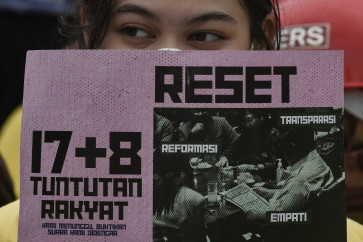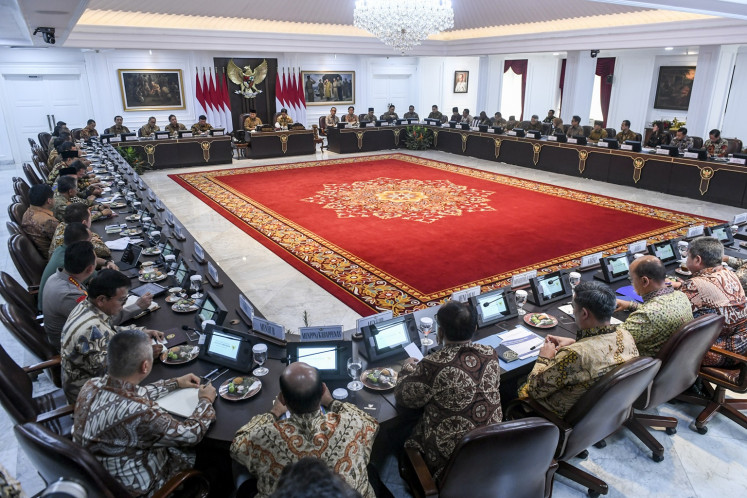Popular Reads
Top Results
Can't find what you're looking for?
View all search resultsPopular Reads
Top Results
Can't find what you're looking for?
View all search resultsNew bill bans unregistered, contractual marriages
A government-sponsored bill on marriage could see unregistered and contractual marriages banned, while polygamous marriages could end in jail sentences and fines if conducted in violation of procedures
Change text size
Gift Premium Articles
to Anyone
A government-sponsored bill on marriage could see unregistered and contractual marriages banned, while polygamous marriages could end in jail sentences and fines if conducted in violation of procedures.
The religious court on marriage bill threatens to jail couples — for up to three months, with fines of up to Rp 5 million (US$415) — for tying the knot without either the proper documents or the presence of an authorized religious official.
State officials who help administer illegal marriages would also face a maximum jail sentence of one year and/or fines of up to Rp 6 million.
Nasaruddin Umar, director general of Islamic guidance at the Religious Affairs Ministry, told The Jakarta Post on Sunday the bill was aimed at curbing unregistered marriages and protecting women.
"Unregistered and contractual marriages are detrimental to women. Many women have been made to suffer, because in the absence of regulations concerning those matters, their husbands can easily marry other women," he said.
Unregistered marriages, known locally as nikah siri, are widely practiced in Indonesia.
The House of Representatives' Disciplinary Council recently questioned a United Development Party legislator after reports surfaced that he had married a woman without registering it with the state.
Contractual marriages are rampant among young women living in the hilly resort area of Puncak in the West Java town of Bogor, who opt to marry Middle Eastern tourists for a certain period of time.
The bill also tightens the prerequisites for polygamous marriages, including adequate financial capability on the part of a man seeking to take a second wife. A letter of consent would also be required from the first wife.
“We're trying to cut back on instances of men committing polygamy,” Nasaruddin said.
A recent survey found polygamy was a significant factor behind the country's rising divorce rate.
Nasaruddin said the bill, drafted by the Religious Affairs Ministry, had been submitted to the State Secretariat for the President's perusal.
He added it would complement the 1971 marriage law, which has long come under criticism from women's activists.
Muslim intellectual Siti Musdah Mulia said the new bill, despite its progressive contents, would be unable to protect women and children.
She added the bill was not enough to fulfill the Convention on the Elimination of All Forms of Discrimination Against Women (CEDAW), which the country adopted several years ago.
“The government is still hesitant about curbing discrimination against women,” she claimed.
She added the penalties facing offenders were too weak to deter men from proposing unregistered, contractual or polygamous marriages.
“The bill needs to be revised due to the loopholes,” she said.
“The government has to be more careful with many illegal Muslim leaders who administer unregistered marriages, especially in remote areas.”
She suggested the Religious Affairs Ministry revise the bill before it was submitted to the House for deliberation. (naf)










